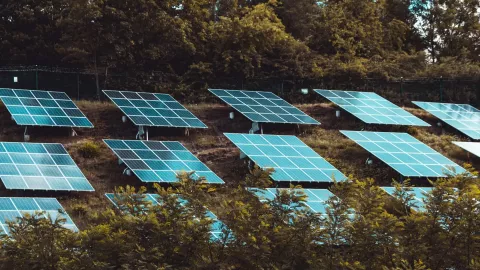More renewable energies, better air quality
There is no Planet B. If we want to reduce climate change and reverse the effects that are already being felt in the oceans, forests or cities, we must continue to focus on the energy transition. This is one of the most important steps to also improve the quality of the air we breathe, and reduce the incidence of illnesses and deaths that are associated with air pollution.
EDP has been working for several years for a fast, safe and accessible energy transition for all. That's why we are going to eliminate the use of coal in our plants already in 2025 and achieve 100% renewable electricity production by 2030. The path is not easy, so we invest in innovation both in our operations and in new services that allow people to improve the sustainability of their lives, and of the planet.
Electric mobility to reduce emissions
It is in the traffic of cities and main roads that the effect of air pollution is most noticeable. Even avenues with lots of trees, pleasant places to walk, are affected by the invisible enemy that pollutants are, whether suspended in the air or deposited in soil and plants. The commitment to smooth mobility - on foot, bicycle, scooter - drastically reduces both the number of cars on the streets and the levels of urban pollution.
Cars and other vehicles for transporting people and goods are, however, essential for the movement of people and goods. In this sense, the transition to electric mobility helps to improve air quality, especially in densely populated or industrialized areas. It was in 2014 that EDP launched the first electric mobility service aimed at residential customers in Portugal, constantly reinforcing the offer. In 2020, EDP Comercial became the exclusive energy partner of the Association of Electric Vehicle Users. Spain and Brazil are other countries where the promotion of electric mobility is a bet of the group.
EDP was also the first Portuguese company, in 2019, to join The Climate Group's EV 100 initiative, a group of more than 100 large global companies that commit to having an all-electric vehicle fleet by 2030, in addition to providing charging stations for employees. Altogether, these multinationals represent more than 5 million vehicles from 80 countries.


More renewable energy in EDP, less pollution
When the electricity produced comes exclusively from renewable sources, we will know that we are closer to achieve sustainability at a global scale. It is in the sun and the wind, intermittent but inexhaustible sources - along with water - that the hope for 100% clean energy resides.
EDP has been increasingly reducing the use of coal - by 2025, EDP plants will be coal-free - and natural gas, and investing in renewable energies, in order to have an efficient and diversified portfolio that improves performance and creates value in the economy and society. Innovation projects such as floating solar panels, Open Data or the PV Tech Lab are increasingly developing the solar photovoltaic generation in large-scale, while Bairro Solar paves the way for the creation of small communities of production and sharing of electricity, improving efficiency and sustainability in urban areas.
In the wind energy sector, Windfloat, in Viana do Castelo, is already a milestone in offshore electrical production, with the largest wind turbines in the world in floating format, and has been the scene of several innovative projects. Like Pivot Buoy, creating versatile deep-water platforms; Atlantis, for the application of robotics in the inspection and maintenance of offshore wind structures; or Durable, which seeks to improve competitiveness, both in solar and wind energy, through international technical cooperation, with the Atlantic coast being the link between EDP's various partners.

Wave power to aid sustainability on land
The oceans still have a lot to offer in the field of energy, an immense potential that can help to multiply solutions, with the ultimate aim of reducing the use of fossil fuels and air pollution. The Sea Titan, which brings NEW together with several international entities, is one of EDP's most recent projects, with a view to developing technology to increase the capacity to produce electricity through waves, with less cost. Before that, NEW and Labelec were involved in DTOceanPlus, an initiative from seven countries committed to creating design tools that, adapted to different needs, facilitate the creation of generation systems from ocean energy.

Flexibility to combat emissions
Decarbonisation and improved air quality are achieved through the investment in renewable energies, but also through greater efficiency in conventional production, through the flexibility and complementarity of energy sources, and through improved consumption at the level of buildings. With FLEXnCONFU, for example, EDP is testing the incorporation of hydrogen in combined cycle power stations, to lower natural gas consumption and its own emissions, while studying the production and storage of hydrogen associated with the same power plant.
SATO bets on the energy efficiency of buildings, seeking to create an integrated and intelligent technological solution, based on the cloud, which allows a building to evaluate itself, in order to reduce both consumption and emissions poluentes.re:dy
Sparcs, an international project funded by H2020, also seeks to develop energy efficiency on the larger scale of a neighborhood or city. Maia joins six other European cities in the search for urban solutions that facilitate the creation of Positive Energy Blocks, small geographic areas in which the existing renewable production exceeds their consumption. This is achieved by integrating the various components of residential, outdoor or commercial electricity use, in order to maximize efficiency and avoid carbon emissions.

More than 25 years of environmental policy
In 1994, EDP launched its first Environmental Policy, demonstrating the group's concern with social well-being and respect for nature in its various activities, seeking, from the outset, to minimize these impacts. More than 25 years later, in February 2021, a new document was signed to reaffirm this same commitment to the planet.
In addition to nine basic commitments to ensure "the implementation and maintenance of adequate and effective environmental management systems, with the ultimate purpose of Sustainable Development", EDP undertakes to carry out concrete actions "in order to protect the environment and enhance the natural capital”. Climate Change, Circular Economy and Biodiversity are the three main axes of this more direct action, where improving air quality is one of the main objectives.

In defense of the forest
Trees and other vegetation are mainly responsible for capturing carbon dioxide and consequently renewing the air. In recent years, EDP has increasingly invested in protecting forests, particularly in areas associated with the production and distribution of electricity. In Brazil, the use of drones for the installation and maintenance of new lines drastically reduces the amount of trees cut along this route. In Portugal, with more mature networks, E-REDES' investment has been increasing in programs to support reforestation - following fires - but also in inspection and intervention actions in the green strips next to electricity lines. In 2020, this investment amounted to 16 million euros, an increase of 26% compared to the previous year.
Combating air pollution is something we do every day, with increasingly renewable energy production, a constant investment in innovation, and a commitment to electric mobility and the efficiency of all our facilities. But we also promote this with our customers, with innovative solutions that allow us to reduce and change consumption patterns. All together, let's continue to fight for less pollution, for air quality, for the sustainability of the planet.

